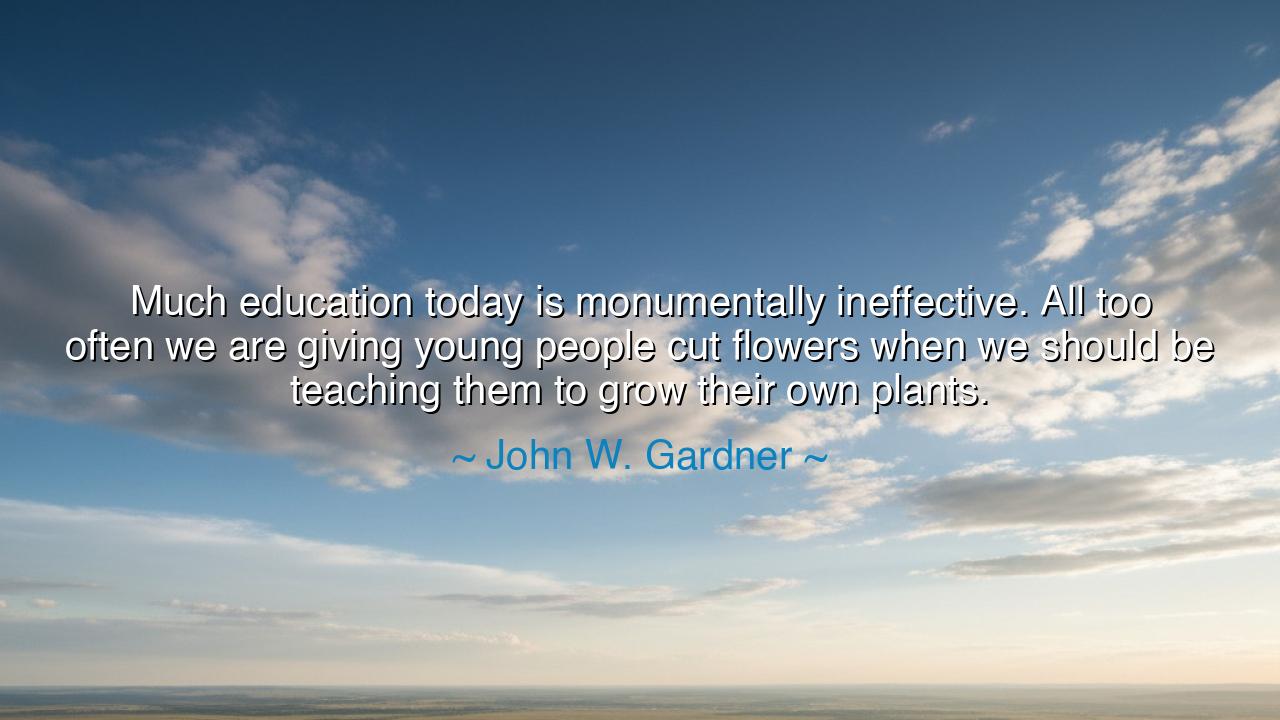
Much education today is monumentally ineffective. All too often
Much education today is monumentally ineffective. All too often we are giving young people cut flowers when we should be teaching them to grow their own plants.






“Much education today is monumentally ineffective. All too often we are giving young people cut flowers when we should be teaching them to grow their own plants.” So declared John W. Gardner, a man of deep reflection and moral clarity, who devoted his life to public service and the renewal of the human spirit. His words are not a condemnation of teachers, but a lament for a world that has forgotten the true purpose of education — to awaken, not to instruct; to plant seeds, not to hand out bouquets. For knowledge, when handed like a finished gift, fades and withers. But when cultivated within the soul, it grows endlessly, bearing fruit for generations.
In this vision, education is not the memorizing of facts, but the nurturing of thought. The cut flower that Gardner speaks of is beautiful, yes — but already dying. It represents the kind of learning that is shallow and temporary, that decorates the mind but does not nourish it. When we teach young people only to repeat what they are told, to seek grades instead of understanding, to fear mistakes more than ignorance, we are giving them flowers cut from their roots. Such knowledge blooms briefly but cannot survive the first drought of real life. To teach them to grow their own plants, however, is to show them how to think, how to question, how to discover — to give them not the flower, but the soil, the seed, and the sun.
This truth was known to the ancients. In the courtyards of Athens, Socrates taught not by lecture, but by dialogue. He asked questions that disturbed, inspired, and transformed. He did not hand his students truths like cut roses; he made them till the soil of their own minds, until the roots of wisdom took hold. Many could not bear this, for it required patience, humility, and courage. Yet from his method sprang Plato, Aristotle, and the birth of philosophy itself. Such is the power of teaching that calls forth growth instead of compliance. Socrates taught them not what to think, but how to think — and thus his garden still blooms in every age.
Consider too the story of Maria Montessori, the great educator who refused to see children as empty vessels. She believed that every child carried within them the seed of potential, needing only the right environment to grow. In her classrooms, the teacher did not dominate but guided; the students did not memorize, they discovered. Her methods produced not parrots of information, but independent thinkers who could care for themselves and their world. In this way, Montessori followed the same truth Gardner expressed centuries later: that true education is cultivation, not decoration.
When Gardner lamented the ineffectiveness of modern education, he spoke as one who saw beyond his time. In an age obsessed with tests, ranks, and standardized minds, he reminded the world that learning is a living process. The goal is not to fill minds with facts, but to ignite the flame of curiosity that burns long after the classroom walls have faded from memory. The mind that learns to grow its own knowledge will never go hungry. The mind that depends on others for nourishment will forever starve in the wilderness of conformity.
And what of us, the inheritors of his wisdom? We must learn again to be gardeners of the mind. Let teachers not be florists who hand out arrangements of ready answers, but cultivators who awaken the soil of the soul. Let students not crave the comfort of easy blossoms, but seek the deeper joy of growth. True education is slow, demanding, and beautiful. It requires both sunlight and storm. It teaches patience, resilience, and wonder — the virtues that no textbook can give.
So let this be the lesson for all who hear: do not settle for cut flowers — for borrowed truths and secondhand thoughts. Seek the living garden of knowledge. Read deeply, question fearlessly, fail often, and grow again. Tend your own mind as a gardener tends his field — with love, discipline, and hope. The flowers you grow yourself will outlast every bouquet handed to you. For the wisdom rooted within you cannot wither; it lives, it breathes, and it multiplies.
And thus, in the words of John W. Gardner, remember: the greatest gift of education is not beauty given, but beauty cultivated. Let your mind become a living garden — one that grows with every question, every wonder, every act of creation — and the world will bloom with you.






AAdministratorAdministrator
Welcome, honored guests. Please leave a comment, we will respond soon